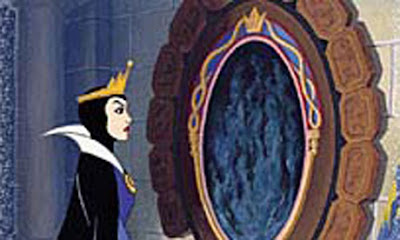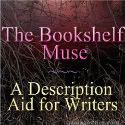 |
| Mirror, mirror, what do you see? I think I look like Harry P. |
The notion of "comparables," in pub biz parlance -- those (preferably bestselling, famous) books that are enough like yours, but not too much like, has been occupying me lately, and also occupying both of my crit partners. One partner's agent asked her for a list of comparables, and she had a hard time thinking of any. The other, who is in the process of querying, is worried that her novel is too much like another (bestselling, famous) one with a similar subject -- so her job is to set it apart. In literature, of course, there's nothing new under the sun, and there's not a thing wrong with that. But the notion of comparables when it comes to marketing is particularly slippery -- because what, precisely, are we comparing?
 |
| Could be like my book? Should be like my book? |
When I was helping one of my crit partners look for comparables, I found stories that shared some of her themes, but not her settings or storyline. And researching comparables for my own book (science fantasy), I found lots of books that had ecological themes, or super bright kids, but few of them were in my genre.
And it's an important subject to think about, because you may want to include comparables in your query (some agents like to see this, some don't care), and you'll probably want to mention comps if you're pitching verbally at a conference. So, fellow novelists and aspiring novelists -- how much do you think your WIP shares with other books out there? Is it something you're conscious of, or something you've put off thinking about? Asked to come up with "three books off the top of your head," like Amy Boggs, could you do it?
















Honestly, I'm wrestling with this exact thing right now... I've been reading voraciously for about a month and still have yet to come up with a couple books to compare my story to.
ReplyDeleteI've been told (by CP's) that the story feels like a contemporary/historical (because the stakes are personal rather than save-the-world), yet it takes place in a fantastical setting... but with no magic/supernatural elements. Throw in the fact that it's 2 male protagonists, and I'm tearing my hair out pretty good :)
So far the closest I've come up with is 'The Knife of Never Letting Go' by Patrick Ness, but with less violence/war and no romantic element.
Hi, Gail, I left you an award on my blog -- The Versatile Blogger Award. Stop by and pick it up.
ReplyDeleteThis is such a great topic. Sometimes I've included comparables in my queries and sometimes not. I think it is right to think "theme" instead. I've said things like, if you liked the romance in X...or the mystery in Z.
ReplyDelete@Christina this is really, really great advice. Thank you!
ReplyDelete@Elizabeth: Well, thank you Mrs. Seraphina. I actually *just* got this award a few days ago from another blogger, but I'm happy to pass along the compliment to five more bloggers.
So @1000th Monkey: does thinking about theme as Christina suggests help you narrow things down?
...not really... though it does have SIMILAR thematic elements to 'TKoNLG' which is why I picked it, for that, and because of the setting.
ReplyDelete:)
...this just gives me a good excuse to keep reading ;)
I'm facing this issue too. I tend to lean toward not including comparables, unless specifically requested, when querying. I think it's important to know where your story falls in the genre and the marketplace though so you know which agents to approach, how to manage your expectations etc.
ReplyDeleteGood question. I'm including two comparables in my current query because that what we're "supposed" to do. But it feels awkward. Like what if the agent hates those books or thinks I'm setting my sights too high?
ReplyDeleteThanks for the earlier follow, BTW!
ReplyDelete@MG, I know, I feel the same way, slightly embarrassed. I'm going to compare myself to The Golden Compass? In my dreams, maybe?
ReplyDeleteVery interesting. I think about this a lot, and, like Christina Lee just said, I sometimes add these comparables in a query and sometimes not.
ReplyDeleteI find it helpful to compare my work to other authors, not actual titles. Example:
Dear Ms. Agent Lady. I think my 75,000-word YA novel, Vampire-Ninja-Turtle-Werewolf Boy, will find a home with fans of Holly Black and Cassandra Clare.
That way, you're making a comparison about the genre and not necessarily the story or subject matter.
I forgot to add thanks for visiting my blog and for the Follow. Nice blog you have here.
ReplyDeleteI think it's important for you as an author to know how similar your work is to published materials. But for me, when querying agents, I think it's crucial to know how your book is a good fit for the agent. A lot of times, this includes me finding comparisons between my book and books she may have repped, or authors she reps who have written books like mine. So I guess when it comes to comps and querying, I tend to tailor mine more toward each agent.
ReplyDeleteBecca @ The Bookshelf Muse
Ah, that's good advice, too, Becca. Thanks.
ReplyDelete@Ron: Hi Ron, thanks for the visit. Also a good point, and implies there will also be many, many fans for your book, right?
I say many thanks to the father of the website admin I read this, because at this website I know a lot of information information that I did not know before his
ReplyDeleteObat Untuk Atasi Kemandulan
Krim Penghilang Jerawat Terbaik
Obat Sakit Tenggorokan
Obat pembersih Rahim Kotor
Cara Mengatasi Gigi Berlubang
Obat Sakit Payudara Bengkak
Cara Menghilangkan Kejang Perut
Obat Herbal Bronkitis Kronis
Kopi Yang Sehat Bagi Jantung
Obat Insomnia Berat